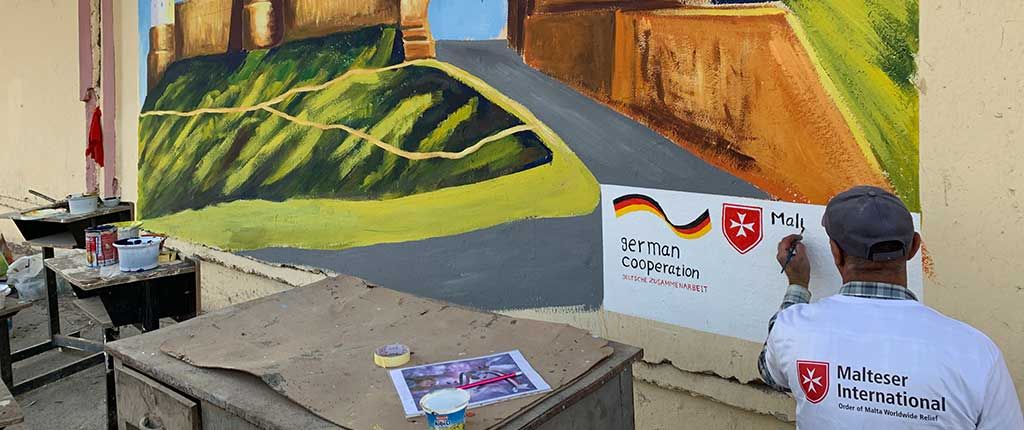
This project has been completed.
Creating long-term development opportunities in Iraq
Our project areas of Sinjar, Talafar, Telkief and Hamdaniya in the Ninewa Governorate of Iraq are inhabited by a diverse population of ethno-religious groups: Yezidis, Turkmen, Shabak, Christians, Kakai, Kurds, Arab Shiites and Sunnis. During the armed conflict with the Islamic State (IS), the majority of these groups were expelled from the area. Many villages were destroyed.
Since 2018, we have been working to rebuild the region and create prospects for the returning population. With this subsequent "Intervention for More Durable Assistance and Development (IMDAD)" project of the Ninewa Return Program, we want to ensure that people find sustainable and long-term prospects in their home regions. Together with our local partner organizations Doctors Aid Medical Activities (DAMA) and Women Rehabilitation Organization (WRO) we are working towards a more comprehensive approach that aims to create secure income opportunities, promote social cohesion, and provide access to quality healthcare and rehabilitation services. The most vulnerable populations are the focus of our work.
In June 2014, the Islamic State proclaimed a caliphate in Iraq. The ongoing military campaign led to massive displacement of the population inside and outside Iraq. The war of liberation two years later caused further massive destruction. The victory over the Islamic State was declared in December 2017 and reconstruction and return of displaced people to their home regions began. This phase is still ongoing but is repeatedly affected and slowed by changing dynamics.
4.1 million people (10% of the total population) need humanitarian assistance in Iraq (as of 2021). More than 1.3 million people are displaced, more than half of them for more than three years. Nonetheless, the number of official refugee camps nationwide has declined in recent years. The government is rapidly closing camps, putting pressure on many IDPs who cannot return to their homes. For example, those said to be affiliated with the IS face rejection from their home communities and further displacement.
The Governorate of Ninewa, with 1.35 million people depending on support, continues to face significant challenges and service gaps. The Ninewa Plains is home to a third of Iraq’s ethno-religious minorities including Christians, Yazidis, Kurds, Turkman, Shabaks as well as Arab Shia and Sunni. During IS rule, in addition to the violence inflicted on religious minorities in particular, their livelihoods such as businesses, farms, community centers, and health facilities were destroyed. The return process to this area has been slow, due to concerns about the security situation, political instability as well as massive damage to infrastructure and lack of income-generating opportunities and shelter for the people. Nevertheless, recent reports indicate an increasing return trend. It is now crucial to build trust and cohesion among the population and prevent new conflicts.
The impact of the conflict on young people has also been dramatic, having missed out on parts of their childhood and having had very limited education during the conflict. Young people today are often marginalized, excluded from community decision-making mechanisms and job opportunities. These conditions create a dangerous breeding ground for new conflicts. Yet it is precisely the young population that has the potential to become compelling agents of positive change when engaged and empowered.
We aim to ensure a sustainable and dignified return of displaced pesons to Sinjar, Talafar, Tilkief, and Hamdaniya based on economic recovery, social cohesion and access to good quality health care and rehabilitative services, with a focus on the most vulnerable among the population.
Our target scenario is as follows:
- Community members are able to support themselves and have higher incomes as their livelihood skills have been strengthened. In addition, people of different backgrounds and religions live together in peace and harmony.
- Access, quality and efficiency of basic and environmental health services have improved through rehabilitation of health infrastructure and promotion of human resources and institutional capacity in the underserved districts of Sinjar and Talafar.
Our comprehensive range of activities is designed to restore a lively and peaceful daily life to enable residents to settle and re-establish themselves there. The project activities include the following measures:
Reconstruction:
- In Talafar, we are rehabilitating a children's hospital ward and building a new rehabilitation center.
- In Sinjar, we plan to rebuild a primary healthcare center.
Income security:
- We are offering training courses in hairdressing, maintenance of mobile phones, agricultural techniques (crop farming and livestock) and business management.
- We are enabling small and medium enterprises to restart business.
- We are organizing annual agricultural markets.
- We are renovating agricultural infrastructure such as greenhouses, poultry farms etc. and renew irrigation systems for agriculture.
Peaceful coexistence:
- We rehabilitate community spaces.
- We train NGO staff in the Do-No-Harm principles and in dealing with trauma.
- We encourage women and men to participate in intercultural activities and events.
- We train community mediators in conflict prevention.
Country info
Capital: Bagdad
Area: 437.072 km²
Population: about 41,1 million people
Project info
Partners: Doctors Aid Medical Activities (DAMA), Women Rehabilitation Organisation (WRO)
Financing: German Federal Ministry for Economic Development and Cooperation (BMZ)








